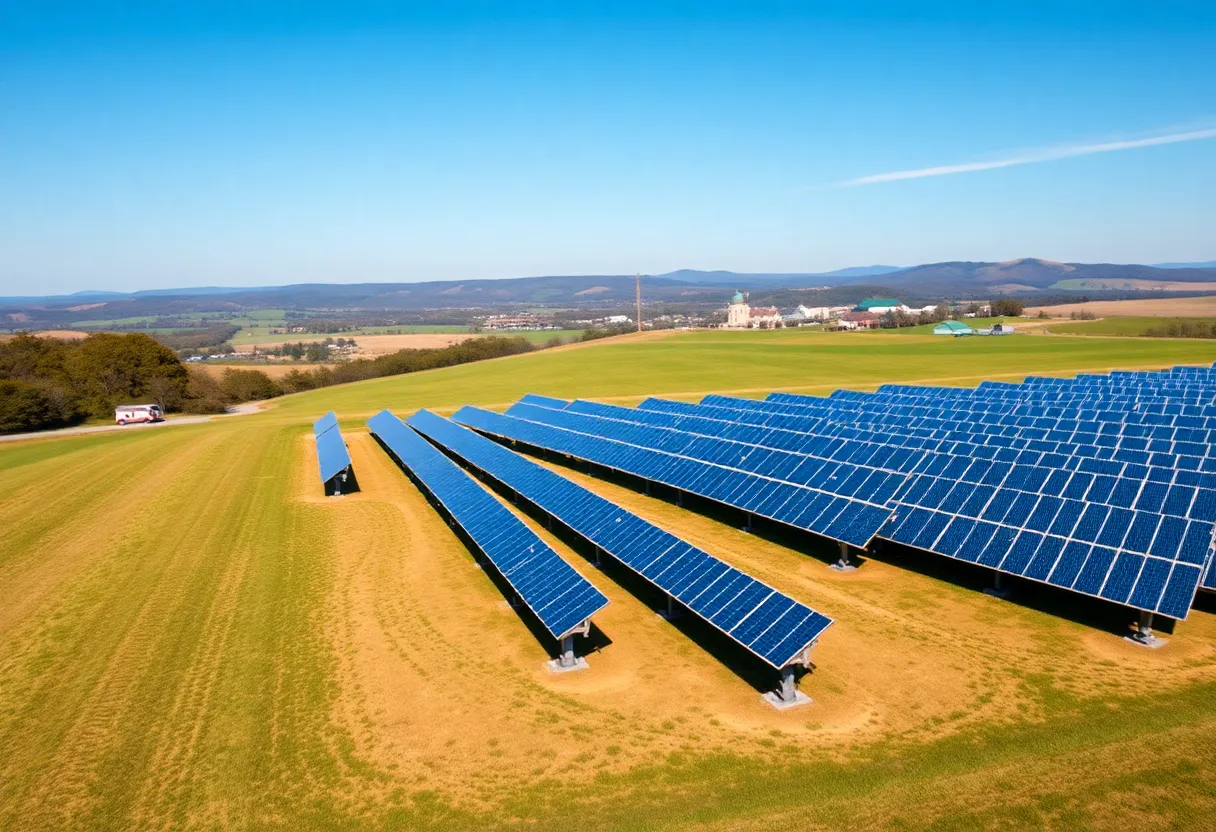Pennsylvania, September 4, 2025
News Summary
Pennsylvania’s solar industry is flourishing as new initiatives and large-scale projects emerge, including the Mechanicsburg Solar Project—the state’s largest solar installation. This project generates clean electricity for 12,000 homes annually and has created significant job opportunities. Additionally, initiatives focusing on solar energy integration in schools could lead to massive savings and environmental benefits. As communities embrace solar energy, the state positions itself for a sustainable future while addressing climate change and pollution.
Pennsylvania’s Solar Industry Sees Remarkable Growth with New Initiatives
Pennsylvania’s solar industry is experiencing substantial growth, highlighted by the introduction of large-scale solar projects and a push for solar initiatives in schools. The Mechanicsburg Solar Project, noted as the state’s largest utility-scale solar installation, boasts an impressive capacity of 70 megawatts and spans across 500 acres in Cumberland County. Since becoming operational in 2021, this project has had a significant impact, supplying clean electricity to approximately 12,000 homes annually.
The benefits of the Mechanicsburg project extend beyond just energy generation. The project has created 250 construction jobs and 12 permanent positions while generating around $1.6 million annually in tax revenue for local communities. Additionally, it plays a crucial role in combating climate change, as it is estimated to reduce carbon emissions by 80,000 tons each year, an impact equivalent to removing 15,000 vehicles from the roads.
Integration of Renewables in Agriculture
The Keystone Solar project, located in Lancaster County, complements this growth by generating 6 megawatts of clean electricity while preserving agricultural land usage. Constructed on former farmland, this project allows local farmers to continue agricultural activities beneath the solar panels. Keystone Solar has collaborated with local utilities to ensure community benefits, which include a community engagement program featuring educational tours and internship opportunities for students.
Moreover, Pennsylvania is repurposing areas previously affected by industrial activity. Projects like the Nesquehoning solar facility, a 10 MW installation on a former coal mining site, and the Hazelwood Green installation in Pittsburgh—rated at 2.5 MW and situated on former steel mill grounds—spearhead efforts to combat legacy pollution while producing clean electricity.
Future Prospects in Education
The growth of solar energy in Pennsylvania also points toward schools as a valuable resource for clean energy generation. With nearly 2,000 football fields’ worth of rooftop space available, solar panels could be installed on Pennsylvania schools, potentially generating enough electricity to power over 180,000 homes statewide. This initiative could result in estimated savings of $342 million for taxpayers over the systems’ lifetimes.
For instance, in Erie County, solar installations on schools might generate enough electricity for 4,426 homes in just the first year after installation. The Erie County Technical School has already received a $400,000 grant for a solar array project under the Solar for Schools grant program.
The report emphasizes the need for continued funding and support for the Solar for Schools initiative and the federal Clean Energy Investment Tax Credit. Schools can maximize their energy use during sunny days, aligning perfectly with solar energy generation patterns. Projects, such as that of the Steelton-Highspire School District, project savings up to $4 million over the next 20 years.
Economic and Environmental Benefits
In addition to the direct benefits of solar installations, there is potential for significant savings for schools in Dauphin and Cumberland Counties, estimated at over $10 million over their lifetimes. Despite some districts in Erie County expressing concerns regarding roof conditions and the pace of returns on prior investments, the general consensus is pushing towards enhancing solar adoption.
As Pennsylvania’s solar industry continues to expand, local, state, and federal officials are urged to facilitate solar adoption in schools and communities, positioning the state for a cleaner, more sustainable future.
FAQ Section
What is the Mechanicsburg Solar Project?
The Mechanicsburg Solar Project is Pennsylvania’s largest utility-scale solar installation with a capacity of 70 megawatts, generating clean electricity for approximately 12,000 homes annually.
How much tax revenue does the Mechanicsburg Solar Project generate?
The project generates approximately $1.6 million in annual tax revenue for local communities.
What are the potential savings for schools installing solar panels?
If implemented statewide, solar panels on schools could generate enough electricity to power over 180,000 homes and save taxpayers an estimated $342 million over their lifetimes.
How does solar energy help reduce carbon emissions?
Solar energy installations, like the Mechanicsburg Solar Project, are estimated to reduce carbon emissions by 80,000 tons annually, which is comparable to removing 15,000 vehicles from the road.
Deeper Dive: News & Info About This Topic
Construction PA Resources
Pennsylvania Faces Threats to Clean Energy Amid GOP Budget Cuts
Tax Credit Rollback Threatens Renewable Energy Growth in Pennsylvania
Additional Resources
- GoErie: Solar Panels on Pennsylvania School Roof Cheaper, Lower Pollution
- WGAL: Solar Panels Pennsylvania Schools Could Save Millions
- OnPattison: Top Solar Farms in Pennsylvania Making an Impact
- Power Magazine: Renewable Properties Acquires Pennsylvania Solar Power Portfolio
- Post-Gazette: Pennsylvania’s Solar Clean Energy
- Wikipedia: Solar Energy
- Google Search: Pennsylvania Solar Schools
- Google Scholar: Pennsylvania Solar Energy
- Encyclopedia Britannica: Solar Energy
- Google News: Pennsylvania Solar Initiatives





